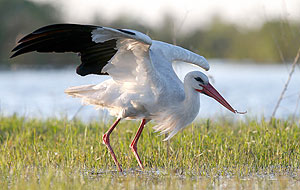Ru
|
Eng
Belarus joins International Stork Census
19.06.2014

Belarus has joined the 7th International Stork Census held under the auspices of BirdLife International, BelTA learned from Belarus' bird protection organization.
The campaign aims to get information about the population of white and black storks. The census will count birds in the entire breeding area in European countries, the Middle East, North Africa and Central Asia.
“The census will take into account the number of nests occupied by birds, the number of nestlings and the number of nests where nestlings did not grow up. The information regarding the number of white storks is important to control the population figures and develop measures to protect this species,” the bird protection organization explained.
All people can take part in the census. The period from the end of June till the end of July is the best time for the research because it is possible to count the number of adult storks and nestlings. The detailed information about the census will be available at the website of the Belarusian bird protection organization. The website will also provide necessary instructions.
The stork census in Belarus is organized by the NASB scientific research center for bioresources and an official partner of BirdLife International in Belarus – the Belarusian bird protection organization.
The monitoring of the stork population can give detailed information about the environmental condition and will help promptly react on ecological changes. Therefore, the international stork censuses have been conducted since 1934. Such campaigns are held once in ten years.
The first national census of white and black storks in Belarus was conducted in late 1950s. According to the previous census, in 2004 there were about 21,500 pairs of white storks in Belarus, or 9% of the world population, and more than 1,000 pairs of black storks. Belarus had the forth-largest population of white storks after Poland, Spain and Ukraine.
The campaign aims to get information about the population of white and black storks. The census will count birds in the entire breeding area in European countries, the Middle East, North Africa and Central Asia.
“The census will take into account the number of nests occupied by birds, the number of nestlings and the number of nests where nestlings did not grow up. The information regarding the number of white storks is important to control the population figures and develop measures to protect this species,” the bird protection organization explained.
All people can take part in the census. The period from the end of June till the end of July is the best time for the research because it is possible to count the number of adult storks and nestlings. The detailed information about the census will be available at the website of the Belarusian bird protection organization. The website will also provide necessary instructions.
The stork census in Belarus is organized by the NASB scientific research center for bioresources and an official partner of BirdLife International in Belarus – the Belarusian bird protection organization.
The monitoring of the stork population can give detailed information about the environmental condition and will help promptly react on ecological changes. Therefore, the international stork censuses have been conducted since 1934. Such campaigns are held once in ten years.
The first national census of white and black storks in Belarus was conducted in late 1950s. According to the previous census, in 2004 there were about 21,500 pairs of white storks in Belarus, or 9% of the world population, and more than 1,000 pairs of black storks. Belarus had the forth-largest population of white storks after Poland, Spain and Ukraine.
SCIENCE. TECHNOLOGY. INNOVATIONS
13.08.2024
28.06.2024
28.06.2024
25.06.2024
05.06.2024
15.05.2024
15.05.2024
26.04.2024
26.04.2024
26.04.2024













